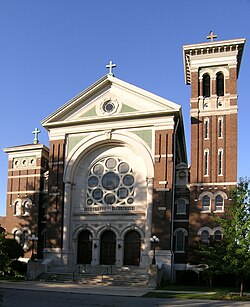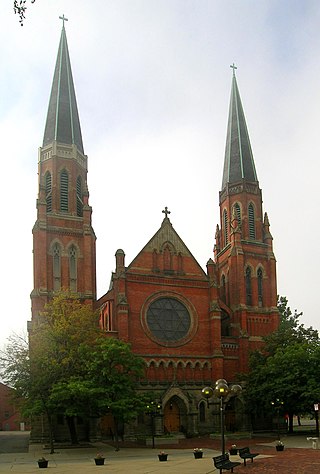
Basilica of Sainte Anne de Détroit (Sainte-Anne-de-Détroit) was founded July 26, 1701 by French colonists in New France, and is the second-oldest continuously operating Roman Catholic parish in the United States. The current Gothic Revival cathedral-styled church, built in 1886, is located at 1000 St. Anne Street in Detroit, Michigan, in the Hubbard-Richard neighborhood, near the Ambassador Bridge, and the Michigan Central Station. At one time it was the seat of a diocese that included French territory in Ontario, Canada south of the Detroit River.
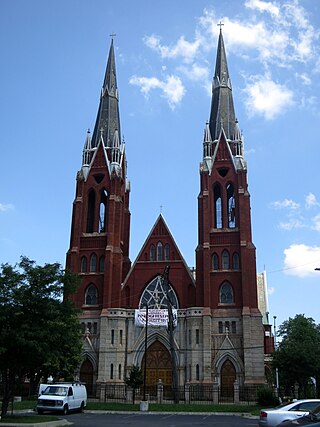
The Sweetest Heart of Mary Roman Catholic Church is located at 4440 Russell Street in Detroit, Michigan, in the Forest Park neighborhood on the city's central East side. The Gothic Revival cathedral styled church is the largest of the Roman Catholic churches in the City of Detroit. It was designated a Michigan State Historic Site in 1974 and listed on the National Register of Historic Places in 1978. It, along with St. Albertus Roman Catholic Church, 0.4 miles east on East Canfield Street, and St. Josaphat Roman Catholic Church, 0.3 miles west at East Canfield Street and Chrysler Drive, served the large Polish community through most of the twentieth century. In a diocesan reorganization instituted by Archbishop Allen Vigneron in 2013, Sweetest Heart of Mary joined with St. Josephat to form Mother of Divine Mercy Parish.

The Sacred Heart Roman Catholic Church, Convent and Rectory is a Roman Catholic church complex located at 1000 Eliot Street in Detroit, Michigan. It was designated a Michigan State Historic Site in 1975 and listed on the National Register of Historic Places in 1980.

The Chapel of St. Theresa–the Little Flower was a church located at 58 Parsons Street in Midtown Detroit, Michigan. It was later known as St. Patrick Church. The building was listed on the National Register of Historic Places in 1997, and demolished in September 2023.
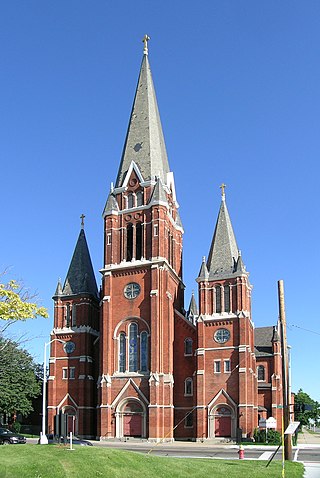
St. Josaphat Roman Catholic Church is a Roman Catholic church located at 715 East Canfield Street in Detroit, Michigan. It was listed on the National Register of Historic Places in 1982 and designated a Michigan State Historic Site in 1985. Since 2013, it has been one of two churches that comprise Mother of Divine Mercy Parish.

St. Boniface Roman Catholic Church was a Roman Catholic church located at 2356 Vermont Avenue in Detroit, Michigan. It was also known as St. Boniface-St. Vincent Roman Catholic Church. The church was designated a Michigan State Historic Site in 1983 and listed on the National Register of Historic Places in 1989, but was subsequently demolished in 1996. The church was removed from the NRHP in 2022.
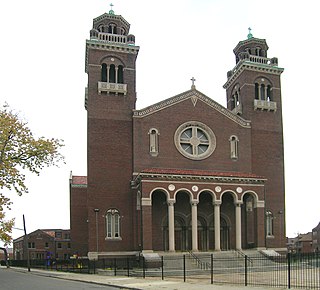
The St. Theresa of Avila Roman Catholic Church is a church located at 8666 Quincy Street in Detroit, Michigan. It was listed on the National Register of Historic Places in 1989.
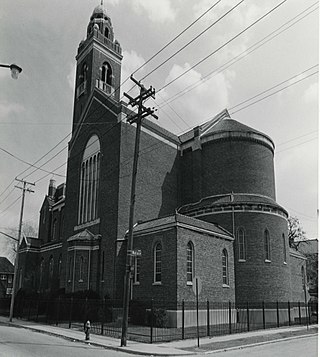
St. Thomas the Apostle Catholic Church was a church located at 8363 and 8383 Townsend Avenue in Detroit, Michigan. It was listed on the National Register of Historic Places in 1989, but was subsequently demolished.

The St. Catherine of Siena Roman Catholic Church is a church located at 4151 Seminole Street in Detroit, Michigan. It is now the St. Augustine and St. Monica Roman Catholic Church. The church was listed on the National Register of Historic Places in 1991.

The Assumption of the Blessed Virgin Mary Church is a Catholic church of the Archdiocese of Detroit located at 13770 Gratiot Avenue in Detroit, Michigan. It is commonly known as the Assumption Grotto Church. The church community was founded in the 1830s, and the present building completed in 1929, designated a Michigan State Historic Site in 1990 and listed on the National Register of Historic Places in 1991.

The Most Holy Redeemer Church is located at 1721 Junction Street in Southwest Detroit, Michigan, within the West Vernor–Junction Historic District. The church was once estimated as the largest Roman Catholic parish in North America. West Vernor–Junction Historic District is adjacent to Mexicantown and contains a growing Mexican community and resurgent neighborhood.

St. Mary Roman Catholic Church, formally the Church of the Immaculate Conception of the Blessed Virgin Mary, is in the third oldest Roman Catholic parish in Detroit, Michigan. Designed by German-born Peter Dederichs and built for the formerly ethnic German parish of the 19th century, it is located at 646 Monroe Street in what is now considered the heart of the Greektown Historic District in downtown Detroit. It is often called "Old St. Mary's Church" to avoid confusion with other St. Mary's parishes: in the Redford neighborhood of Detroit, or in nearby Royal Oak, Monroe, or Wayne.
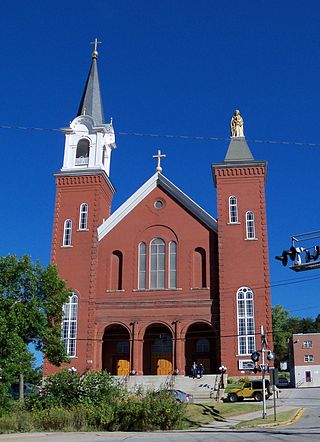
St. Anne Church is a historic church at 58 Church Street in Berlin, New Hampshire, United States. It is the church for Good Shepherd Parish within the Roman Catholic Diocese of Manchester. St. Anne Parish was founded in 1867, and was Berlin's first Roman Catholic congregation. It was merged with Guardian Angel Parish, St. Joseph Parish, and St. Kieran Parish in 2000 to form Good Shepherd Parish. Its building, constructed in 1900, is an important local example of Romanesque architecture, and was listed on the National Register of Historic Places in 1979.

St. Francis Xavier Roman Catholic Parish Complex is a historic former Roman Catholic church complex located in Buffalo in Erie County, New York.

Saint Mary of Good Counsel Catholic Church is an active church building located at 305 Division Street in the city of Adrian in Lenawee County, Michigan. It was listed on the National Register of Historic Places on February 24, 1983. It is also designated as a Michigan State Historic Site.

Immaculate Conception Catholic Church is a parish of the Roman Catholic Church in Celina, Ohio, United States. Founded later than many other Catholic parishes in the heavily Catholic region of western Ohio, it owns a complex of buildings constructed in the early 20th century that have been designated historic sites because of their architecture. Leading among them is its massive church, built in the Romanesque Revival style just 43 years after the first Catholic moved into the city: it has been called northwestern Ohio's grandest church building.

St. John the Baptist Catholic Church is a historic church, with an associated rectory, school, and cemetery, located at 324 S. Washington Avenue in Hubbardston, Michigan. The church was built in 1868. It was added to the National Register of Historic Places and listed as a Michigan State Historic Site in 2001. The parish is clustered with St. Mary parish in Carson City, Michigan.

The St. Vincent DePaul Catholic Church, Convent, and School is a historic church located at 46408 Woodward Avenue in Pontiac, Michigan. It was designated a Michigan State Historic Site in 1987 and listed on the National Register of Historic Places in 1989.

Saints Peter and Paul Roman Catholic Church Complex is located in Milwaukee, Wisconsin. The complex was added to the National Register of Historic Places in 1991 for its architectural significance.
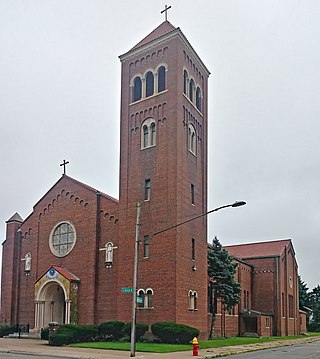
The Church of the Transfiguration Historic District is a group of buildings associated with what was the Church of the Transfiguration Roman Catholic parish, located at 5830 Simon K in Detroit, Michigan. It was listed on the National Register of Historic Places in 2019.
